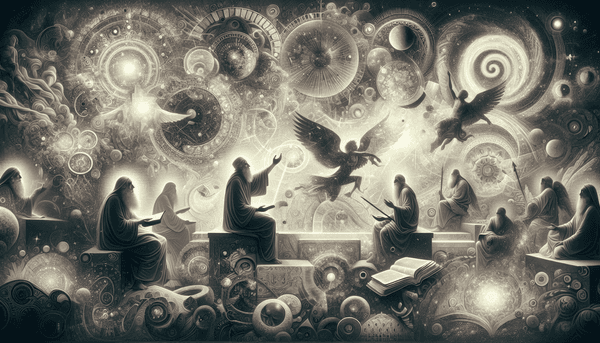Divine Responses in Scripture
The story of Nadab and Abiú also opens a window into understanding divine responses to human actions. Their punishment was immediate and severe, as the fire of God consumed them, an act of divine retribution that illustrates the gravity of God's holiness and the seriousness with which He regards disobedience. This incident is one of several examples throughout the Bible where God intervenes directly, often with life-and-death consequences. The nature of God's holiness is further depicted in Isaiah's vision in Isaiah 6:1-5, where even the seraphim declare the Lord's utter holiness. As Romans 11:22 suggests, we are to consider both the kindness and sternness of God, living with a healthy fear of the Lord, which Proverbs 9:10 emphasizes as the beginning of wisdom.
Dreams and Divine Warnings
Dreams have often served as conduits for divine messages, as illustrated in the stories of Joseph and Daniel. In Genesis 41:25-32, Joseph interprets Pharaoh's dream, revealing God's forewarning of seven years of plenty followed by seven years of famine. Similarly, in Daniel 2:27-28, Daniel interprets King Nebuchadnezzar's dream, demonstrating how God can use dreams to communicate His plans. In our quest for understanding, we are encouraged to seek divine wisdom, particularly in discerning the meaning behind our dreams or spiritual experiences. James 1:5 assures us that if any of us lacks wisdom, we should ask God, who gives generously to all without finding fault, and it will be given to us. This assurance invites us to pray earnestly for discernment, aligning our interpretations with the truth of Scripture and the leading of the Holy Spirit.
FAQ
Q: Why did Nadab and Abiú offer strange fire?
A: The Bible does not provide a detailed explanation of why Nadab and Abiú offered strange fire. It only tells us that they did so, and that this was displeasing to the Lord.
Q: What was God's response to Nadab and Abiú, and why?
A: After Nadab and Abiú offered strange fire, the Lord sent fire that consumed them, resulting in their death. The specific reason for God's response is not explicitly stated in the Bible.
Q: What is 'strange fire'?
A: The 'strange fire' mentioned in Leviticus 10:1 refers to the unauthorized incense that Nadab and Abiú offered before the Lord, which He had not commanded them to use.
Q: Does God use dreams to communicate?
A: Yes, in the Bible, God uses dreams as a means to communicate and warn people, as seen in the dreams of Pharaoh and King Nebuchadnezzar, which were interpreted by Joseph and Daniel respectively.






